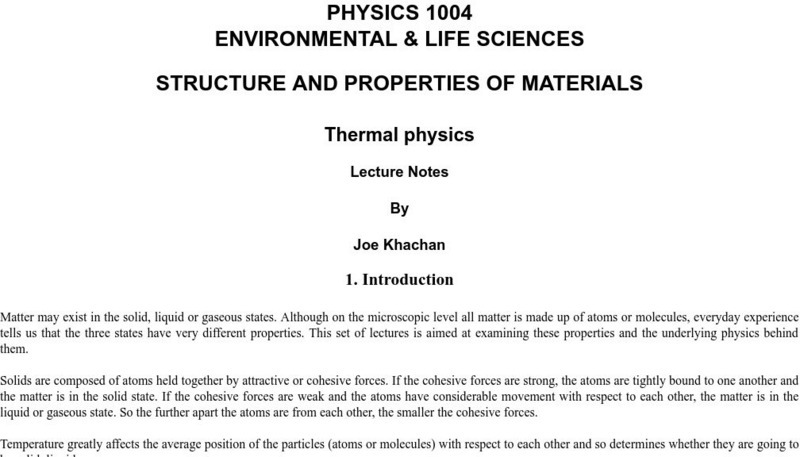Curated OER
Wetland Food Webs
Middle schoolers study life science. In this food webs and food chains comparison lesson, students examine the wetlands to discover the relationships that exist between the animals that live there. They participate in group activities...
Curated OER
Coral Bleaching in the Caribbean
Students use authentic satellite data on the NASA website to determine when the sea surface temperature meets the criteria to induce coral bleaching.
Curated OER
Forest Food Web Activity
Students gain knowledge of food webs and ecological interconnections in the forest, and place different life forms in their proper place in a food chain. Students appreciate the balance of nature and how humans are affected by extinct...
Curated OER
Boyle's Law
Students experiment on Boyle's law using balloons and other common materials. For this chemistry lesson, students explain the relationship between pressure and volume. They solve problems relating to Boyle's Law.
Curated OER
Kinetic Theory
Students describe how molecules of the different phases of matter move according to the Kinetic Theory. In this chemistry lesson, students observe and participate in teacher demos. They give real world applications of the kinetic theory.
Curated OER
Hearing Galileo's Whisper Across the Solar System
Students read and answer questions about satellites. In this satellites lesson, students read information about Galileo's Whisper and satellite capabilities.
Curated OER
A Stellar Review
In this science worksheet, students find the answers to the vocabulary matching activity. Then they fill in the boxes with the correct words.
Curated OER
Alka-Seltzer Rockets: How to Build Your Own Rocket
Young scholars create a rocket using Alka-seltzer of baking soda and vinegar. In this physics lesson plan, students identify the factors affecting the length of time the rocket is propelled. They relate this activity to actual rocket...
Curated OER
Convection
Young scholars experiment with the cyclic process of convection and apply the principal to everyday events.
Curated OER
Electrical Circuits And Switches
Students design and draw circuits with batteries, small light bulbs and common household conductors. They build and test the circuit then modify it so someone who couldn't use their hands could turn the circuit on and off.
Curated OER
Charles’s Law
High schoolers describe the relationship between temperature and volume. In this chemistry instructional activity, students perform an experiment and record their their results. They use Charles' law to explain their observations.
Curated OER
Electrical Current
Young scholars describe an electrical current and the factors that determine the resistance of an object. In this electrical current lesson students discuss their knowledge of voltage, current and resistance.
Curated OER
Elements Found in Living Things
In this elements instructional activity, students review the most common elements found in living things. Students color in two pictures with the percentages of the elements found in that living thing.
TeachEngineering
Teach Engineering: Got Energy? Spinning a Food Web
Students learn about energy flow in food webs, including the roles of the sun, producers, consumers and decomposers in the energy cycle. They model a food web and create diagrams of food webs using their own drawings and/or images from...
BBC
Bbc: Gcse Bitesize: Heat Energy Changes in Chemical Reactions
This lesson focuses on heat energy changes in chemical reactions. Exothermic reactions transfer energy to the surroundings. Endothermic reactions take in energy from the surroundings. It also offers links to a video and a test.
Texas Education Agency
Texas Gateway: Law of Conservation of Energy: Heat Transfer
Given illustrations, scenarios, descriptions, and/or diagrams, students will demonstrate understanding of heat transfer.
University of Calgary
University of Calgary: Energy Education: Geothermal Gradient
A good, concise explanation of the geothermal gradient and how and why the Earth's temperature gets hotter and hotter with increasing depth. Includes two diagrams showing this and the heat transfer mechanisms that are taking place.
Georgia State University
Georgia State University: Hyper Physics: Heat Engine Cycle
The heat engine cycle is defined and discussed. So pressure-volume diagrams are introduced and their use in depicting the cycles of a heat engine is demonstrated. Informative graphics are accompanied by reason-filled explanations.
Georgia State University
Georgia State University: Hyper Physics: Heat Engine Concepts: The Otto Cycle
Schematic diagrams illustrating the operation of a four-stroke engine cycle. Interactive buttons allow you to step through the various steps of each engine cycle. Each graphic is accompanied by an excellent explanation.
Other
Nearpod: Endothermic & Exothermic Reactions
In this instructional activity on endothermic and exothermic reactions, students explore chemical reactions, energy transfer, and energy diagrams.
CK-12 Foundation
Ck 12: Calorimetry
[Free Registration/Login may be required to access all resource tools.] Using diagrams and practice problems, students learn how the units of calories are used to measure the energy of the heat transfer. They also discover how...
University of Sydney (Australia)
University of Sydney: Structure and Properties of Materials/thermal Physics
An exhaustive set of "lecture notes" on various topics in thermal physics (including thermal expansion). Explanations are well done and more interesting than most. Includes both a mathematical and conceptual treatment of topics. Humor,...





















